In an era of online presence for all business pages, bloggers and content creators worldwide can’t survive without it. A CMS is also one of the quickest and most effective techniques to create and maintain a site. CMS makes it easier for you to handle digital content; this makes it easier for one to build a website without necessarily having to hire the services of a web developer. Whether you plan on opening an online business, selling products online, blogging, or developing your website, there is one CMS platform that will best suit your needs.
In this blog, you will explore 12 best CMS platforms for 2025, including options for website builders, enterprise solutions, and those with the highest market share. We’ll also help you understand the differences between various CMS website builders and guide you in choosing the platform best suited to your needs.
What is a CMS, and Why Should You Use One?
CMS is a software application that helps in the creation, management, and editing of computer content. It gives an interface through which you can deal with aspects of your website even with no coding knowledge at all. There is a variety of features, including templates, content scheduling and SEO tools which are integral to enabling the owners of the sites to create engaging and attractive sites.
Why Should You Use a CMS?
- Ease of Use: A CMS makes the creation and management of a site easy. So, without going technical, you can make a professional-looking site.
- Customization: There is always a wealth of design flexibility available with almost all CMS systems through the use of topics and extensions.
- SEO Features: Most of the best CMS platforms provide a few integrated SEO features or SEO extension programs that can be useful in enhancing your website’s performance on search engine results.
- Security: The core of the CMS always receives security fixes and upgrades to help safeguard your site from digital threats.
- Scalability: The possibilities of most CMS platforms are infinite, therefore they are perfect for websites that evolve.
12 Best CMS Platforms for 2025
1. Word Press

From the list of some of the best CMS platforms, WordPress is considered to be amongst the most used, as it works with more than 40% of Internet websites. There is an unlimited choice of themes, plugins, and many other add-ons on the platform. WordPress is one of the most preferred choices for building a small blog, a business website or an enterprise CMS 2025. It’s excellent to use the website builder for you especially if you are an amateur or experienced developer. InboundREM, an agency designing real estate websites, recommends WordPress to anyone who needs customizability in the web design.
Key Features:
- Extensive plugin ecosystem.
- Large community support.
- Developers can fully customize it regarding themes and plugins.
- Excellent SEO capabilities.
Positives:
- Free and open-source CMS
- Pleasant and intuitive throughout, the MOEMS offers unconditional accessibility to even the inexperienced.
- It can be used for any type of website ranging from a simple blog to a service that sells products online.
Negatives:
- Requires third-party hosting.
- Often, updates in the system can be a little boring when it comes to maintenance.
Pricing: Free (requires hosting and domain).
Best for: Blogs, business websites, eCommerce.
Ratings: 4.7/5
Website: WordPress.org
2. Wix
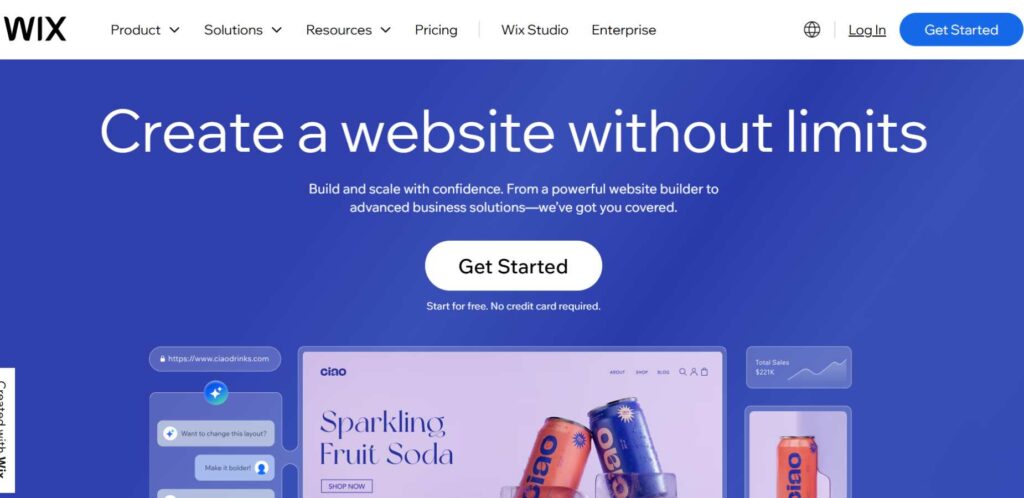
Wix is a simple CMS platform with a well-developed site builder that uses drag-and-drop controls so those who do not have any coding skills are welcome. This is ideal for creating an individual web page or a page for a small enterprise or for a portfolio. SEO tools and a multiplicity of templates are supported by Wix as well as eCommerce functionality.
Key Features:
- Website builder, Content management system — a drag-and-drop product.
- Integrated eCommerce capability.
- Ready-made designs to help users build webpages with ease.
Positives:
- Extremely user-friendly.
- No technical skills required.
- Another advantage of Square is that it is for freelancers, small businesses, and individuals.
Negatives:
- Much of the work is done once the website is published and it is not easy to make a lot of changes.
- More dependence on hosting and servers than stand-alone software solutions.
Pricing: Free plan available; paid plans start at $14/month.
Best for small businesses, portfolios, and personal websites.
Ratings: 4.6/5
Website: Wix.com
3. Square Space

Squarespace is a website builder and a CMS that boasts great and mobile-friendly templates. Photographers, designers, artists – anyone who would like to exhibit their creations online can use it. The software comes equipped with integrated eCommerce and blogging capabilities that allow it to also be suitable for small business people.
Key Features:
- This software has beautiful and responsive templates.
- Cross of blogging capabilities with the eCommerce functionalities.
- Computerized SEO tools and data examination.
Positives:
- They are great for design because they enable a pleasing look to the website.
- Web hosting is included in the package offered by the all-in-one platform.
- Ease to use and no programming code knowledge required.
Negatives:
- There is still less flexibility in comparison to the other trading platforms.
- It is more costly than some of the competitors in the market.
Pricing: Plans start at $16/month.
Best for: Creatives, personal websites, small businesses.
Ratings: 4.7/5
Website: Squarespace.com
4. Shopify

Shopify is an Enterprise CMS that provides solutions mainly for creating E-commerce sites. Shopify is one of the most reliable platforms if you want to sell your products online and it has all the necessary tools to manage products, payments and track customers. Being one of the top enterprise CMS systems in 2025, it is very suitable for businesses in the development process.
Key Features:
- Integrative platform for the operation of an eCommerce business.
- The integrations of the payment gateway.
- Customer service and security are some of the best aspects of the site.
Positives:
- Friendly integration with the payment processors.
- Customizable with advanced functionality for expanding companies.
- 24/7 customer support.
Negatives:
- Transaction fees unless you use Shopify Payments.
- Simple interfaces that other developers do not offer as many design choices.
Pricing: Plans start at $39/month.
Best for: eCommerce websites and online stores.
Ratings: 4.5/5
Website: Shopify.com
5. Drupal
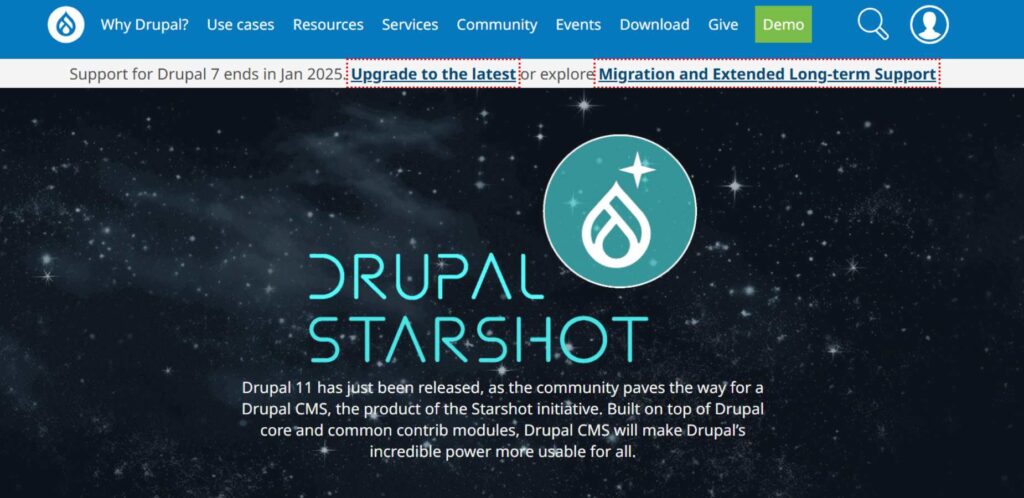
Drupal is an advanced open-source CMS ideal for big websites and Great enterprise CMS 2025. It is very flexible and safe, making it the best choice for creating sites with highly developed content management requirements, such as business sites, official portals, and community sites.
Key Features:
- Very portable and versatile.
- Integrated content management and users.
- Advanced security features.
Positives:
- Recommended for large and complicated web developments.
- Free and has a large amount of active contributors.
- Ideal for websites with lots of content and large companies.
Negatives:
- Most of these tools are complex and demand technical skills for their proper application.
- Lesser number of packaged designs than what is available in WordPress currently.
Pricing: Free (requires hosting).
Best for: Enterprises, government websites, and developers.
Ratings: 4.4/5
Website: Drupal.org
6. WebFlow
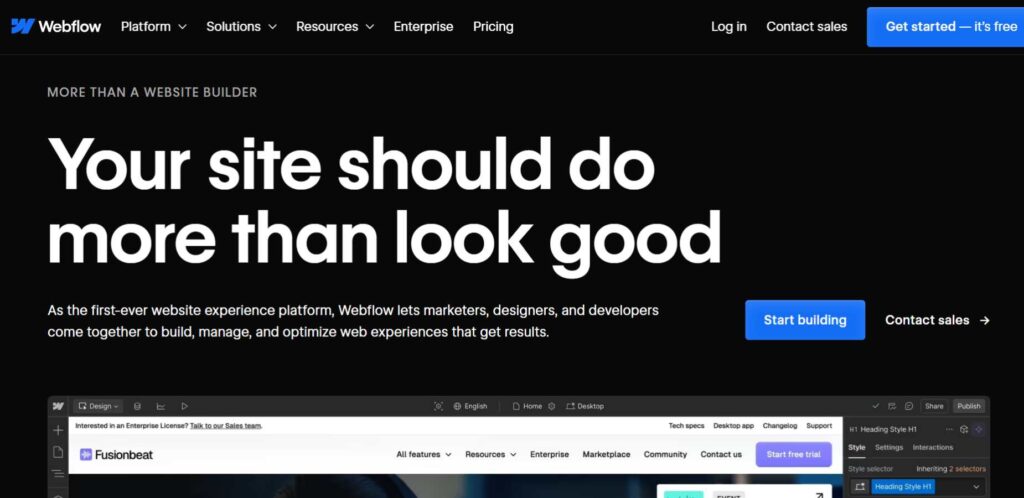
Webflow is a visual CMS website design tool that allows users to drag-and-drop elements into creating a website and at the same time the designer has the option of writing code. It’s ideal for designers who wish to have an exclusive say on the interface of their website cutting on the developers’ services. It is good for responsive design, custom animations and SEO-friendly features.
Key Features:
- Graphical editor where users can freely drag and drop elements they want to program and where there is also full source access.
- Advanced CMS programs for dealing with the content that changes from time to time.
- Built-in SEO tools.
Positives:
- Perfect for designers and agencies.
- Provides full imagination however does not require coding at all.
- Incredibly good for websites that are designed to be responsive.
Negatives:
- Relatively more difficult to learn for those new in the industry.
- Inability to make targeted sales to small businesses due to expensive pricing regimens.
Pricing: Plans start at $14/month.
Best for: Designers, creative agencies, custom websites.
Ratings: 4.7/5
Website: Webflow.com
7. BigCommerce
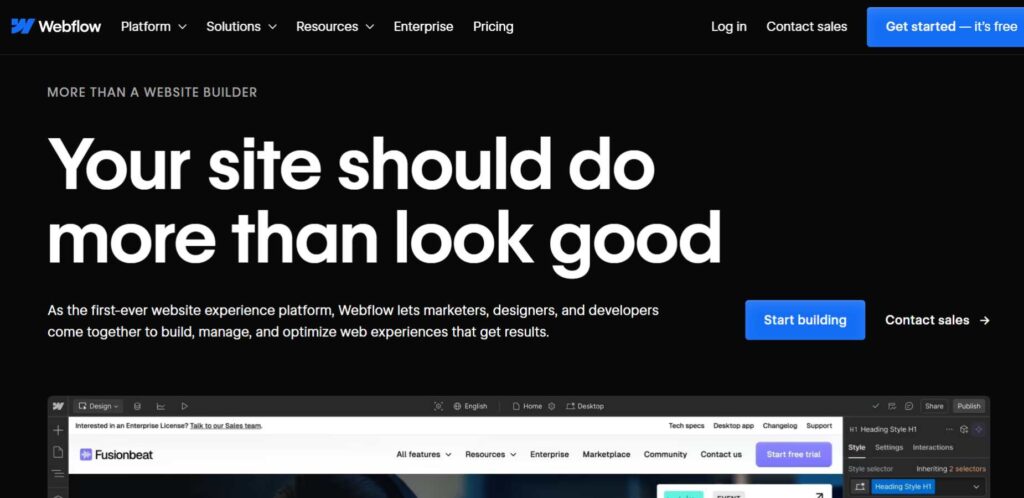
BigCommerce is another enterprise CMS designed for eCommerce just like Magento, and With all these features and functionalities, it also offers excellent website templates. Reliability: Based on the scalable model, BigCommerce is ideal for companies of any range of sellers, from domestic or local firms to international ones. Some of the features that come with it include: product management, secure payments, and integration with other tools.
Key Features:
- eCommerce client and tools integration.
- Support for multiple currencies for internet selling across different countries.
- Good analytical and reporting tools.
Positives:
- Good for large eCommerce businesses.
- Perfectly integrated with other software programs.
- Enterprise-level security.
Negatives:
- It is said to be possible to have some limitations in the flexibility or customization in the case of JBoss.
- Some of the things cost more than Shopify and hence an added expense compared to Shopify.
Pricing: Plans start at $39/month.
Best for: Medium to large eCommerce businesses.
Ratings: 4.6/5
Website: BigCommerce.com
8. Joomla

Joomla is a highly customizable, PHP-based, open-source Content Management System, that can be used to build websites and online applications. It has functionality like content modification, extension integration, and multiple language compatibility.
Key Features:
- They have and implement a very strong content management system on their website.
- Available in free additions interfaced by extensions and based on templates.
- Controls over user administration of the information system.
Positives:
- Good for complex websites.
- Large community and resources.
- Advanced user permissions and multi-language support.
Negatives:
- Steep learning curve.
- Smaller ecosystem compared to WordPress.
Pricing: Free, requires hosting.
Best for: Developers, complex websites, online communities.
Ratings: 4.3/5
Website: Joomla.org
9. Ghost

Ghost is a slimmed-down CMS aimed primarily at blogging and publishing. It is minimally invasive, swift, and built to allow you to come up with a site that is blank and content-centric. Ghost enables writers, bloggers, and anyone who has to develop content and publish it without interruption.
Key Features:
- Straightforward and clutter-free which means that fewer features get in the way of the actual writing.
- Integrative search engine optimization and social networking sharing functionalities are incorporated into the platforms.
- Fast and responsive design.
- Open-source option available.
Positives:
- Fast and secure.
- Great for blogging.
- Simplicity is key here, just perfect for those looking for that clean and simple aesthetic.
Negatives:
- Fewer features as compared to the other similar platforms.
- The open-source version needs to be Self-hosted.
Pricing: Plans start at $9/month.
Best for: Bloggers, writers, content creators.
Ratings: 4.5/5
Website: Ghost.org
10. Weebly

Weebly is a basic CMS platform meant for businesses and individuals. Simple to implement and perhaps the quickest to get working with the drag-and-drop capability.
Key Features:
- Drag-and-drop editor.
- True eCommerce integration right out of the box.
- SEO tools.
Positives:
- User-friendly for beginners.
- Affordable pricing plans.
- Ideal for small businesses and portfolios.
Negatives:
- Negligible degrees of personalization for the power users.
- Less attractive than Wix and Squarespace and offers fewer features.
Pricing: Free plan; paid plans start at $6/month.
Best For: Small businesses, personal websites.
Ratings: 4.5/5
Website: Weebly.com
11. TYPO 3

TYPO3 is an enterprise-level CMS recognized with flexible scalability and extensibility signatures. It’s great for websites that have complex interior page architecture, such as multilingual or multinational websites.
Key Features:
- Multi-language support.
- Granular user permissions.
- It is completely customizable and can be extended with a vast number of extensions.
Positives:
- Perfect for large corporations and websites that are international.
- Flexible and scalable.
- Easy and flexible usage of blockchain technology
Negatives:
- Requires technical expertise.
- Not as easy to get around as other social websites such as Facebook
Pricing: Free; hosting required.
Best For: Large organizations, complex websites.
Ratings: 4/5
Website: TYPO3.org
12. Contentful
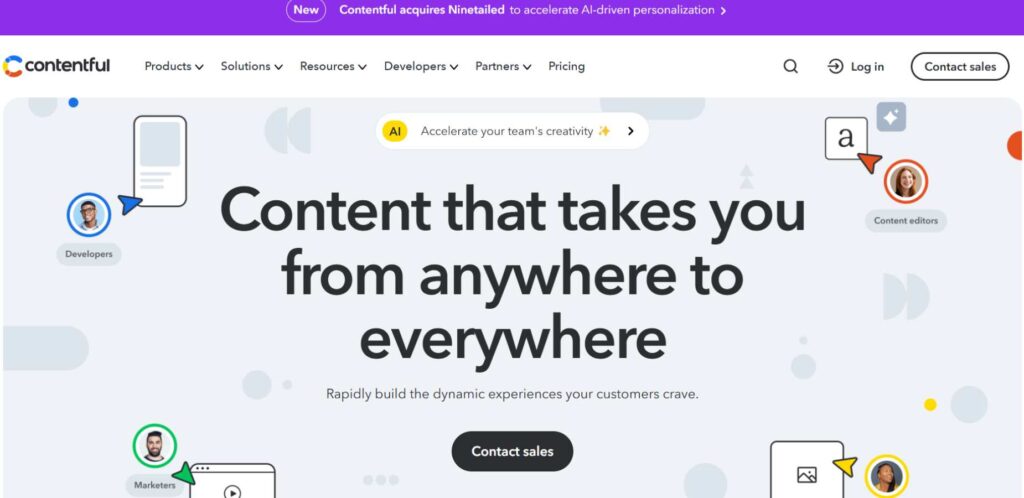
Contentful is a headless CMS, and that means it is only responsible for the content; anything about the look of the content is up to the engineers.
Key Features:
- Fully decoupled architecture for complete freedom.
- Get APIs implemented so you do not have to integrate with any front-end.
- Scalable content management.
Positives:
- Excellent for developers.
- Highly flexible with APIs.
- Ideally suited for the development of specific web applications.
Negatives:
- Requires technical expertise.
- Not beginner-friendly.
Pricing: Free tier available; paid plans from $489/month.
Best For: Developers, enterprise applications.
Ratings: 3.9/5
Website: Contentful.com
How to Select the Right CMS Platform
Selecting the best CMS platform for your project depends on several factors. Here are some recommendations:
- Purpose and Goals: What do you want your website to do? But for blogging purposes, WordPress is perfect. In the case of the CMS market, it has just two main players – Shopify and BigCommerce – that are used for eCommerce.
- Technical Expertise: For first-timers, online site builders such as Wix, Squarespace, Weebly and others are easier to deal with. However, if you are a developer, maybe, it is much better to use Drupal or Webflow since they are more versatile.
- Budget: Think about how much you want to devote. Content management systems such as WordPress and Drupal are open source, but you have to pay for host services. Platforms like Shopify as well as Squarespace provide hosting services for online stores but at a recurring cost.
- Scalability: Consider your requirements that are going to be necessary in the future. Drupal and BigCommerce are both examples of enterprise CMSs that are suitable for business development.
- Support and Community: A large user community is beneficial not only in seeking an answer to a particular problem. WordPress, Drupal or Shopify – any of these solutions offer an incredible user base and support.
Our recommendation
WordPress CMS is still the most versatile, user-friendly, and suitable for both beginners and more experienced users. For users who want to concentrate on eCommerce Salesforce has powerful instruments to create an online store with the help of Shopify and BigCommerce. Webflow as a drag-and-drop tool is perfect for designers – it combines detailed design freedom and an intuitive interface.
Others are Drupal for sophisticated websites or extended internet commerce projects and Magento for internet commerce projects. Both can be very flexible with design but need more advanced IT skills.
If you are a small business, or even if this is your first time creating a website, Wix, Squarespace, and Weebly all offer easy navigation and are cheaper.
Conclusion
Selecting the proper CMS platform is perhaps one of the most important considerations today for creating a successful website in the year 2024. The decision of which CMS platform to choose depends on your online requirements, your goals, and available resources – be it time, money, or desire. Ever in doubt about which CMS to use, whether you are developing a website builder, or a blogging platform for your newborn baby enterprise CMS is a reality.
Taking into consideration the factors discussed above and what each platform provides webmasters can identify the most suitable CMS to use in their website development company and design, knowing what their websites need today and tomorrow.
FAQs
What is the best CMS for beginners?
When starting, Wix, Squarespace, and Weebly are the simplest sites since they mostly comprise templates and are shippable with a drag-and-drop mechanism.
Which is the best CMS to use when creating a blog?
WordPress is still the go-to CMS for blogging because it has some awesome features designed for blogging purposes, is fairly simple to use and integrates many features that users may need.
What is the most suitable CMS for the blog?
This popularity as the best CMS for blogging stems from the fact that WordPress is versatile, backed with an impressive list of plugins, and easy to use. They will find it is the perfect site for them no matter which level they are at as bloggers.
Is it possible to create an eCommerce store via WordPress?
Certainly, WordPress with the WooCommerce plugin can help you construct an efficient eCommerce online business site. It provides several utilities and extensions for products, payments, and customers.
What is the CMS for big companies?
For large-scale websites, it has become the most popular and many people consider it the best enterprise CMS platform than all other CMS platforms due to its flexibility, scalability and enhanced features. BigCommerce is also perfect for large-scale businesses engaging in eCommerce practices.

